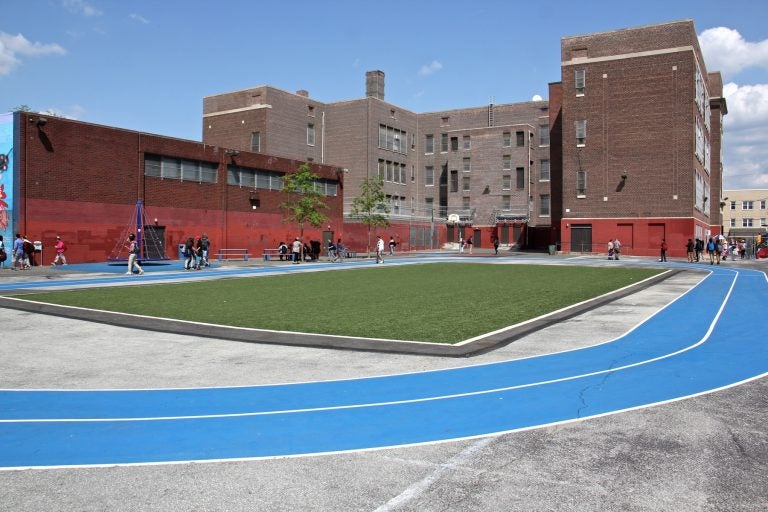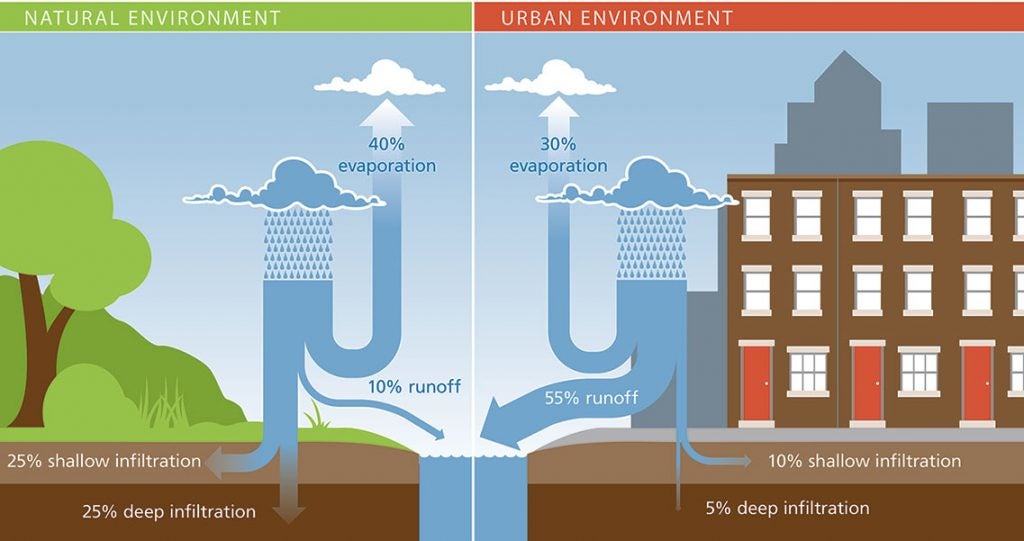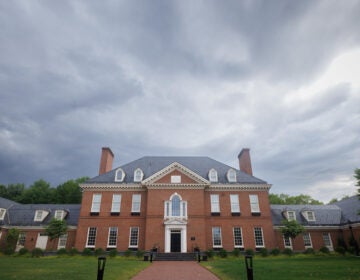How Harrisburg can help Philly green its infrastructure — and economy
President Biden wants to invest big in climate spending. Anna Shipp writes that Pa. can attract D.C. dollars via investments in green stormwater infrastructure.

An astroturf field and track direct rainwater runoff toward a containment basin in the Taggart School playground in South Philadelphia. (Emma Lee/WHYY)
President Joe Biden’s proposed federal budget confronts the daunting challenges of climate change and addresses equity and economic recovery with a bold agenda: increasing climate spending by $14 billion to a total of $36 billion across nearly every federal agency.
New research from the Sustainable Business Network of Greater Philadelphia (SBN) shows that investing in green stormwater infrastructure (GSI) is a proven strategy for all three desired outcomes. The GSI industry spans several sectors, including planning, design, engineering, construction, operations and maintenance, and material supply, and supports upwards of 34,000 workers across Pennsylvania. GSI investments support small businesses and create family-sustaining jobs while providing access to equitably distributed well-maintained public spaces, healthy rivers and streams, and other projects that reinforce climate resilience. By investing in GSI, Pennsylvania stands to reap billions of dollars in economic activity.
It’s a boost that our local economy desperately needs as we continue to trudge through an economic crisis caused by a global pandemic, long-standing racial injustice, and an ongoing but still insufficient effort to both adapt to and mitigate further climate change. With so much on the line, lawmakers must ensure that Pennsylvania is well-positioned to take full advantage of federal stimulus funding.
Defining green stormwater industry
Green stormwater infrastructure (GSI) is best defined as plant and soil systems that reduce stormwater flow before it pollutes our local waterways. Examples of GSI are green roofs, rain gardens, bioswales, and tree trenches. Stormwater is one of the biggest threats to our water quality nationwide. In many places across Pennsylvania, polluted stormwater combines with raw sewage before overflowing directly into our rivers and streams. Due to the threat that stormwater poses to water quality, it’s regulated at the federal level by the Environmental Protection Agency (EPA) and at the state level by Pennsylvania’s Department of Environmental Protection (PA DEP).
GSI can be used to meet both rural and urban stormwater management needs. With 20% of the Commonwealth’s 83,000 miles of rivers and streams impaired as a result of stormwater runoff, GSI is an effective tool for managing combined and separate sewer overflows, reducing agricultural runoff, and restoring streambanks — all of which are key to the state’s $3 billion in agricultural exports and $8 billion in recreation tourism.
Why invest in GSI?
For 20 years, SBN has been representing Greater Philadelphia’s nearly 100,000 small businesses, including businesses in the GSI industry. Because of the significant economic, social, and environmental impact we’ve seen from GSI investments, we embarked on a study conducted by Fourth Economy to look at the size and scale of the industry in Pennsylvania over the last ten years.The report assesses the trends over the last decade, evaluates stormwater management needs and opportunities in urban and rural areas across the state, and ties it all together with recommendations that will position Pennsylvania well to benefit from infrastructure stimulus for GSI.

The report’s findings prove that GSI is an undeniable strategy for economic growth and recovery, while benefiting equitable community development and climate resilience.
GSI offers clear pathways to family-supporting jobs and accessible career advancement for people with all education and work experience levels. GSI spans various sectors and the vast majority are accessible to those without a four-year college degree. Fifty-two percent of GSI workers earn at least $15 per hour, even without a high school diploma or equivalent.
There is an immense need to upgrade Pennsylvania’s stormwater management infrastructure, which is estimated to cost $8.4 billion over the next ten years. Yet, available funding over that time is estimated to be only $900 million, just 10% of the required annual investment. Advancing climate-resilient infrastructure like GSI is a proven strategy for economic recovery and growth. Infrastructure investments proved successful during the Great Recession, with every dollar invested in infrastructure resulting in a 1.5x return in GDP growth. Current forecasts show that investing $1 trillion in infrastructure would create 11 million jobs. Thus, federal stimulus funding for GSI would not only ensure PA has the stormwater management infrastructure it needs, but also drive economic recovery and growth across the Commonwealth.
Philadelphia’s own approach to stormwater management offers a leading example for cities across the U.S. Green City, Clean Waters is the City of Philadelphia’s 25-year plan for managing stormwater with GSI. Since its launch in 2011, the City of Philadelphia has installed more than 2,800 green tools at nearly 800 sites, keeping more than 2.7 billion gallons of polluted water out of local waterways. A combination of public projects, private development regulations, and incentivized private retrofits has resulted in upwards of 10,300 GSI workers in the region alone, and industry growth of 13.3%, which is more than double that of Philadelphia’s 6.3% jobs growth. The GSI industry is prime to continue strong economic growth for years to come.
Action needed in Harrisburg
Our government leaders must encourage the expansion of proven growth industries that create opportunities for diverse small businesses, provide family-supporting wages, support equitable community development, and advance climate resilience. One way lawmakers can do this is by ensuring substantive funding for GSI.
Municipalities across Pa. are best able to leverage federal and state funding for GSI when they have current and comprehensive stormwater management plans and when those plans include GSI as a strategy. Pennsylvania’s Act 167, which requires municipalities to develop comprehensive watershed-based stormwater management plans, was defunded in 2005. It left municipalities across the state without stormwater management plans, limiting their ability to leverage 2009’s federal stimulus funds and girdling their economic recovery.

Legislation must provide financial support to local municipalities to design and implement stormwater management plans with clear guidelines that prioritize GSI and other nature-based solutions and encourage investments in vulnerable communities. By restoring funding for Act 167, increasing funding for the Clean Water State Revolving Fund and other low-to no-cost financing structures, and providing funding for workforce development programs that support diversifying the industry by race and gender, lawmakers can take immediate action in prioritizing green stormwater infrastructure. These specific policy recommendations can help our region and state for years to come.
As Pennsylvania rebuilds its economy, we have an exciting and important opportunity to also advance equity and climate outcomes. GSI is a proven tool that serves all three goals. The administration and the legislature must demonstrate their commitment to equitable economic recovery, small business and job growth, community well-being, and climate resiliency and act now to prioritize green stormwater infrastructure.
Anna Shipp is the executive director of the Sustainable Business Network of Greater Philadelphia.

Subscribe to PlanPhilly
WHYY is your source for fact-based, in-depth journalism and information. As a nonprofit organization, we rely on financial support from readers like you. Please give today.









